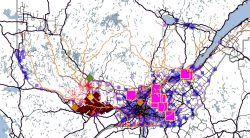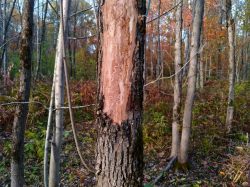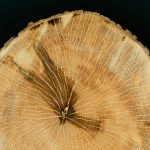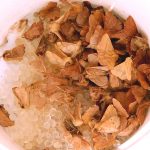François Lorenzetti
Professor in Plant-Animal Relations and Forest Dynamics

819-595-3900 poste 2935
Research themes
Natural disturbance regimes, plant-animal relationships, forest dynamics, plant and animal ecophysiology
Education
- 1999-2002 : Postdoctorate in Forest ecology – Université du Québec à Montréal
- 1993 1998 : PhD in Biology – University of Ottawa
- 1991-1993 : Master of Science – Biology – Université du Québec à Montréal
- 1988-1991 : Bachelor of Science – Biology – ecology option – Université du Québec à Montréal
- 1987 : Certificate in Environmental Sciences – Université du Québec à Montréal
Description of research
I am interested in the relationships between plants and animals at different spatial and temporal scales and at different levels of organization. Interactions between the dynamics of plant and animal populations are of particular interest from a fundamental point of view, and the results can guide the resource management of natural or managed environments.
-
add removeKey publications
- Perrette, G., Lorenzetti, F. Moulinier, J., & Bergeron, Y. 2014. Site factors contribute to aspen decline and stand vulnerability following a forest tent caterpillar outbreak in the Canadian Clay Belt. Forest Ecology and Management 323 : 126–137.
- Moulinier, J., Lorenzetti, F. & Bergeron, Y. 2011. Gap dynamics in aspen stands of the clay belt of northwestern Quebec following a forest tent caterpillar outbreak. Canadian Journal of Forest Research 41: 1606-1617.
- Cooke, B.J., Lorenzetti, F. & Roland, J. 2009. On the duration and distribution of forest tent caterpillar outbreaks in east-central Canada. Journal of the Entomological Society of Ontario 140 : 3-18.
- Cooke, B.J. et Lorenzetti, F. 2006. The dynamics of forest tent caterpillar outbreaks in Québec, Canada. Forest Ecology and Management 226 : 110-121.
-
add removeProjects
Spatial and temporal dynamics of emerald ash borer in the natural forest

I undertook the study of the emerald ash borer in the context of natural forests because, beyond the impacts on urban forests, the dispersal of this exotic insect in the forest matrix could lead to a cascade of significant ecological effects, in particular at the level of riparian forest biodiversity and their contribution to the productivity of these environments. I use multiple approaches to study this exotic insect in this context because I aim to understand the ecosystem interactions in order to quickly sideline the factors that appear important and thus quickly implement solutions and save valuable time. This modus operandi has worked well in other projects I have done, as in the case of the forest tent caterpillar outbreaks on forest regeneration and dynamics.

Importance of ash trees for biodiversity
With the increasing presence of the emerald ash borer in riparian forests, it is important to respond quickly to the question of the role of ash trees as a keystone species, especially as the mortality of these species quickly progresses. With doctoral student Samuel Rosner, and colleague Angélique Dupuch acting as co-director, we examined this role in relation to a species that is undoubtedly considered to be the keystone in riparian environments, the North American beaver. Working in collaboration with the Plaisance National Park of personnel gives us the perfect opportunity to share almost in real time the progress of our research with the people who use this territory. The research conducted in the Park will not only be used throughout the SÉPAQ network where the same issues arise, but may be useful for municipalities, RCMs and various ministries.
Spatio-temporal dynamics of sugar maple growth

As part of the Forêt S’Adapter research program, and in collaboration with my colleagues, Frédérik Doyon and Sylvain Delagrange, and postdoctoral fellow, Benoît Gendreau-Berthiaume, I am leading a project on the long-term growth trajectories of sugar maple in relation to tree architecture, and the influence of forest tent caterpillar epidemics on these trajectories.

Synchronization of outbreaks of forest tent caterpillar
In collaboration with colleague Yann Surget-Groba, we have begun to investigate the population genetics of an epidemic insect, the forest tent caterpillar, and the synchronization of these outbreaks.
Collaborations on other projects : I collaborate on several projects led by my colleague Angélique Dupuch, co-supervising doctoral student, Anna Mazaleyrat, whose research focuses on the success of invasive exotic species; and co-supervising doctoral student , Florian Mézerette, whose research focuses on the bottom-up and top-down effects that influence the regeneration of sugar maple. I am also collaborating with my colleague, David Rivest, on a research project on the influence of windbreaks on the abiotic and biotic conditions of field crops. In this research, I am co-directing doctoral student, Geneviève Gagné, on the effects of tree hedges on crop pests and their natural enemies.
These collaborations allow me to broaden my research on exotic species and to continue studying interactions between the bottom-up and top-down effects that influence the dynamics of herbivore populations.
-
add removeStudents and postdoctoral fellows
Étudiants actuels
Doctorat
Étudiants diplômés
Doctorat
- 2009-2013 Julien Moulinier
Maîtrise
- 2015-2018 Justine Fontaine-Topaloff
- 2012-2014 Guillaume Perrette
- 2012-2014 Catherine Dion
- 2007-2009 Daniel Charbonneau
-
add removeAvailable projects (coming soon)
arrow_backBack to Team
